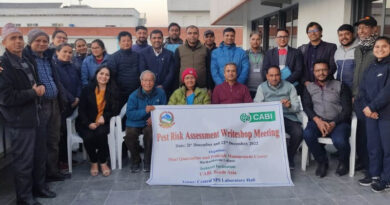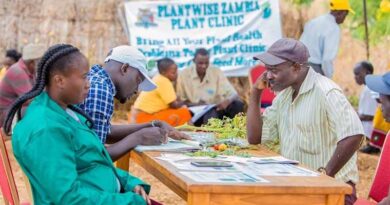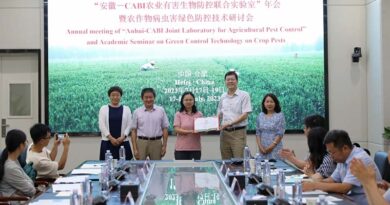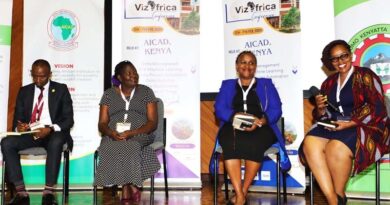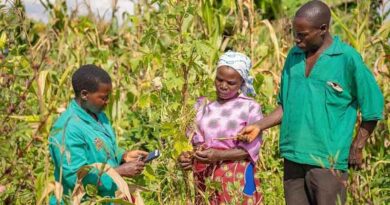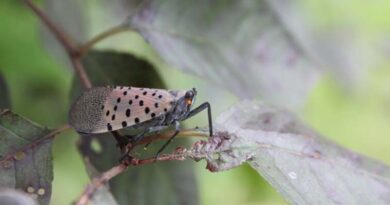First Regional Pest Risk Analysis Workshop for SADC Member States held in Zambia
01 August 2023, Zambia: CABI, as part of the global PlantwisePlus programme, has facilitated the first Regional Pest Risk Analysis (PRA) workshop for Southern Africa Development Community (SADC) Member States in Lusaka, Zambia.
Scientists from CABI’s regional centre for Africa in Nairobi, Kenya, were among those who delivered the five-day workshop to National Plant Protection Organization (NPPO) staff working to prevent the introduction of new invasive crop pests into the SADC region.
Yvonne Mpundu, Permanent Secretary, Administration, in the Ministry of Agriculture (MoA), officially opened the workshop which was also attended by Kenny Msiska, Director, Plant Quarantine and Phytosanitary Service, Esaiah Tjelele, Programme Officer Crops, SADC Secretariat, Dr Zibusiso Sibanda (Plant Health Specialist) for FAO Subregional Office for Southern Africa (FAOSFS) and Dr Noah Phiri, CABI’s Regional Representative, Southern Africa.
SADC secretariat, Dr Esaih Tjelele, thanked CABI, AU IAPSC, SADC Partner States and FAOSFS for attending the meeting and the Government of Zambia for hosting the workshop. He emphasized the need for harmonization of approaches to pest risk analysis at the regional level. He was optimistic that the workshop will contribute to the early detection and preparedness of pests in the region.
Dr Zibusiso Sibanda (Plant Health Specialist) for FAOSFS and Plant Health Coordinator and Support Towards the Operationalization of the SADC Regional Agriculture Policy (STOSAR), appreciated the support from CABI as key to the continuity of the STOSAR Project PRA capacity building efforts.
The importance of PRA to the implementation of the Plant Health Strategy for Africa was discussed by Dr Luiza Munyua (Senior Scientific Officer) from AU-IAPSC who explained that more PRA training, resources and awareness raising were required across the continent and amongst stakeholders.
Regional approach to PRA
At the workshop, CABI developed and tested a regional approach for pest-initiated PRA for priority pests and value chains for the SADC region. This was with a view to developing an effective approach for addressing pest risks that are supported by CABI digital tools.
In workshops that were conducted by CABI in June 2021 and August 2022, special focus, for example, was placed on the range of digital tools offered by CABI. This included the CABI Pest Risk Analysis Tool and the CABI Compendium.
The Pest Risk Analysis tool is a decision-support tool that presents scientific information from the CABI Compendium to aid the selection of appropriate measures for reducing risk of pest introduction and facilitate the safe movement of plants and plant products.
Meanwhile, the CABI Compendium brings together data and research across species, pests, and diseases into one comprehensive resource. CABI Compendium includes images, maps, and diagnostic and links to other decision support tools such as The Horizon Scanning Tool and the Invasive Species Discovery Tool.
SADC priority pests
The aims of the latest workshop included the need to explore the benefits and requirements of a regional approach to PRA to prevent the introduction of new pests into the SADC region. It also sought to present national horizon scanning work in the region and identify SADC priority pests for PRA.
Other aims included gathering feedback on the Pest Risk Analysis Tool in order to improve its usefulness to SADC members and introducing the concept of a pest risk register.
At the workshop, Mrs Mpundu said the government is working towards developing policies that are aimed at enhancing regional agricultural trade and beyond, while Dr Phiri added that there is need to build capacity among SADC member states in order to protect plant resources.
The CABI facilitators leading the workshop were Dr MaryLucy Oronje, Dr Joseph Mulema and Lucinda Charles.
Preventing and management of Plant pests for food production and Safe Trade
Back in 2020 and 2021, CABI supported the operationalization of the SADC Regional Agricultural Policy that will help tackle five key crop pests and diseases affecting its 16 Member States.
The project developed strategies to fight Maize Lethal Necrosis Disease (MLND), tomato leafminer (Tuta (Phthorimaea) absoluta), oriental fruit fly (Bactrocera dorsalis), fall armyworm (Spodoptera frugiperda) and Banana Fusarium Wilt (Fusarium oxysporum f.sp. cubense Tropical race 4 (Foc TR4)).
The Project also provided specialized services to strengthen pest and disease risk analysis capacities in the region, including the development of and, updating of, national commodity pest lists for the SADC Partner States.
In September 2022, Plantwise Plus was launched in Zambia to help smallholder farmers produce more and high-quality food. Part of the programme’s remit is to support Zambia’s MOA predict, prepare and prevent a range of plant health issues which put food security and livelihoods at risk.
Other recent work in Zambia has seen CABI working with the MoA and the Seed Control and Certification Institute (SCCI) in February to promote the growth of healthier cassava crops in Zambia through the distribution of cassava cuttings.
The initiative followed a campaign in August 2022 to curb the spread of Cassava Brown Streak Disease (CBSD) which can lead to a total loss of crop and severely impact food security and the livelihoods of farmers and their families.
CABI is also currently working with the Zambia Agriculture Research Institute (ZARI) and the University of Zambia (UNZA) is on a project, funded by the Australian Centre for International Agricultural Research (ACIAR), to advocate village-based biological control of the devastating fall armyworm in rural Zambia.
Also Read: India’s decision to ban the export of non-basmati rice created a worldwide uproar
(For Latest Agriculture News & Updates, follow Krishak Jagat on Google News)






